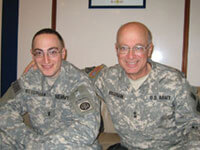Ronald Silverman ’69: Dentist to a Dictator
Ron Silverman ’69 stared into the jaws of death five years ago when he found himself fitting a crown molding for the mouth of Saddam Hussein. Serving in Iraq as a two-star general with a professional background in dentistry, Silverman got the call to fix a broken tooth belonging to Hussein after the Iraqi dictator was arrested by U.S. troops. “We did it at night: one chair, me, my assistant, a translator, and Saddam,” Silverman recalls. “He didn’t know my rank because I wasn’t wearing my uniform — just a dentist’s smock.”
Hussein proved to be a talkative patient, fluent in English; Silverman knows a little Arabic. The main topic of conversation during Hussein’s three visits? History — Silverman’s major at UW–Madison. “My big thing was Roman history, so Saddam and I talked about the Roman invasion of the Middle East. We also discussed the Crusades and why he thought Christians were so bad or whatever,” he says.
Hussein scheduled one more visit, Silverman says, but “he didn’t make his last appointment. They hanged Saddam Hussein before he had the chance to get his tooth cleaning.”
The dentist-chair chats with Iraq’s infamous ruler capped a journey that began four decades earlier, when Silverman joined the UW’s ROTC program. He steered clear of antiwar protests, but remembers the prevalence of tear gas on campus during those turbulent times. After graduating, he earned a DDS at Temple University, served three years of active stateside duty in the army, and then enrolled in the army reserves.
While rising through the military ranks, Silverman also ran a dental practice. A few years ago, shortly before he planned to retire from the service, he received an unexpected promotion. “Two-star general,” he says. “You don’t turn that down.”
In 2006, he took charge of medical care for Iraq’s civilian and military populations. During his tour of duty, he relays calmly, “I had my house rocketed, and I was targeted for assassination. They caught the guy who was going after me. He had a picture of me in his pocket.”
Supervising three thousand soldiers at more than thirty hospitals, Silverman achieved a 90 percent patient-survival rate. Some didn’t make it. “Our helicopter got rocketed, and one of my pilots was killed,” he says. “He was eviscerated. He was a kid. My son served in Iraq at the same time. This pilot probably didn’t look like my kid, but at the time, if you closed your eyes, you’d think it was him. That was the most traumatic thing I experienced.”
Completing his tour of Iraq, Silverman retired from the army and now splits his time between Annandale, Virginia, and Palm Beach, Florida. Describing re-entry into civilian life, he says, “It was tough. After carrying a gun with me for eighteen months, I had certain reflexes. We went to see the Broadway musical Wicked in New York. As we were walking home, I saw something unexpected and suddenly grabbed like I had the gun in my pocket. My wife looks at me and says, ‘You’re not carrying a gun anymore.’ ”
Published in the Fall 2011 issue




Comments
Bob Katanyutanon May 21, 2013
Ron,
It has been a long time but it is nice to read about you.
BobKat